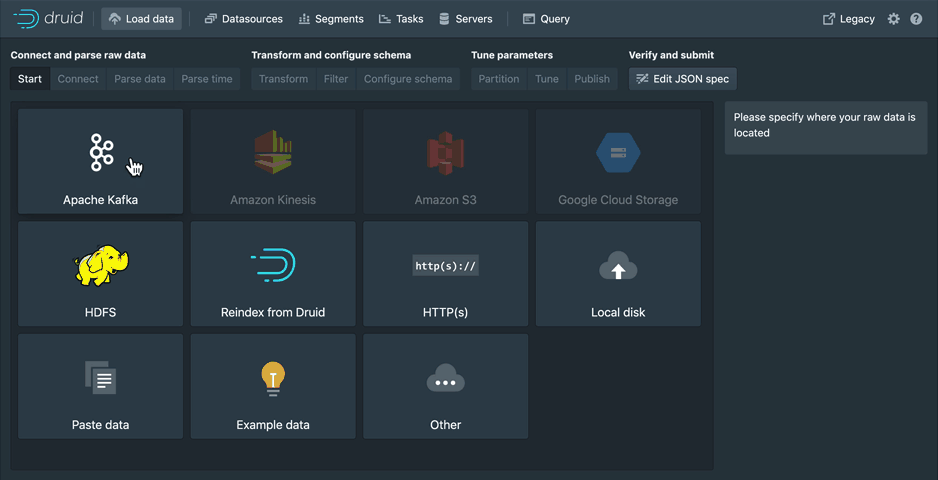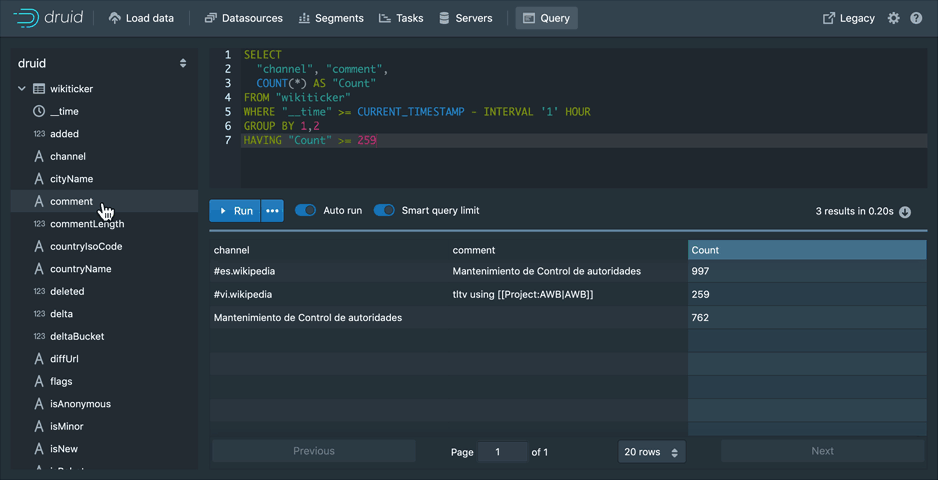* sketch of broker parallel merges done in small batches on fork join pool * fix non-terminating sequences, auto compute parallelism * adjust benches * adjust benchmarks * now hella more faster, fixed dumb * fix * remove comments * log.info for debug * javadoc * safer block for sequence to yielder conversion * refactor LifecycleForkJoinPool into LifecycleForkJoinPoolProvider which wraps a ForkJoinPool * smooth yield rate adjustment, more logs to help tune * cleanup, less logs * error handling, bug fixes, on by default, more parallel, more tests * remove unused var * comments * timeboundary mergeFn * simplify, more javadoc * formatting * pushdown config * use nanos consistently, move logs back to debug level, bit more javadoc * static terminal result batch * javadoc for nullability of createMergeFn * cleanup * oops * fix race, add docs * spelling, remove todo, add unhandled exception log * cleanup, revert unintended change * another unintended change * review stuff * add ParallelMergeCombiningSequenceBenchmark, fixes * hyper-threading is the enemy * fix initial start delay, lol * parallelism computer now balances partition sizes to partition counts using sqrt of sequence count instead of sequence count by 2 * fix those important style issues with the benchmarks code * lazy sequence creation for benchmarks * more benchmark comments * stable sequence generation time * update defaults to use 100ms target time, 4096 batch size, 16384 initial yield, also update user docs * add jmh thread based benchmarks, cleanup some stuff * oops * style * add spread to jmh thread benchmark start range, more comments to benchmarks parameters and purpose * retool benchmark to allow modeling more typical heterogenous heavy workloads * spelling * fix * refactor benchmarks * formatting * docs * add maxThreadStartDelay parameter to threaded benchmark * why does catch need to be on its own line but else doesnt
Apache Druid (incubating)
Apache Druid (incubating) is a high performance real-time analytics database.
Druid is a next-gen open source alternative to analytical databases such as Vertica, Greenplum, and Exadata, and data warehouses such as Snowflake, BigQuery, and Redshift.
Getting started
You can get started with Druid with our quickstart.
Druid provides a rich set of APIs (via HTTP and JDBC) for loading, managing, and querying your data. You can also interact with Druid via the built-in console (shown below).
Load data
Load streaming and batch data using a point-and-click wizard to guide you through ingestion setup. Monitor one off tasks and ingestion supervisors.
Manage the cluster
Manage your cluster with ease. Get a view of your datasources, segments, ingestion tasks, and servers from one convenient location. All powered by SQL systems tables allowing you to see the underlying query for each view.
Issue queries
Use the built-in query workbench to prototype DruidSQL and native queries or connect one of the many tools that help you make the most out of Druid.
Documentation
You can find the documentation for the latest Druid release on the project website.
If you would like to contribute documentation, please do so under
/docs in this repository and submit a pull request.
Community
Community support is available on the druid-user mailing list, which is hosted at Google Groups.
Development discussions occur on dev@druid.apache.org, which you can subscribe to by emailing dev-subscribe@druid.apache.org.
Chat with Druid committers and users in real-time on the #druid channel in the Apache Slack team. Please use this invitation link to join the ASF Slack, and once joined, go into the #druid channel.
Building from source
Please note that JDK 8 is required to build Druid.
For instructions on building Druid from source, see docs/development/build.md
Contributing
Please follow the community guidelines for contributing.
License
Disclaimer: Apache Druid is an effort undergoing incubation at The Apache Software Foundation (ASF), sponsored by the Apache Incubator. Incubation is required of all newly accepted projects until a further review indicates that the infrastructure, communications, and decision making process have stabilized in a manner consistent with other successful ASF projects. While incubation status is not necessarily a reflection of the completeness or stability of the code, it does indicate that the project has yet to be fully endorsed by the ASF.






